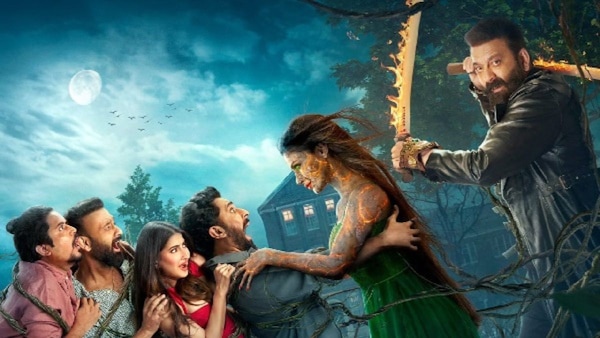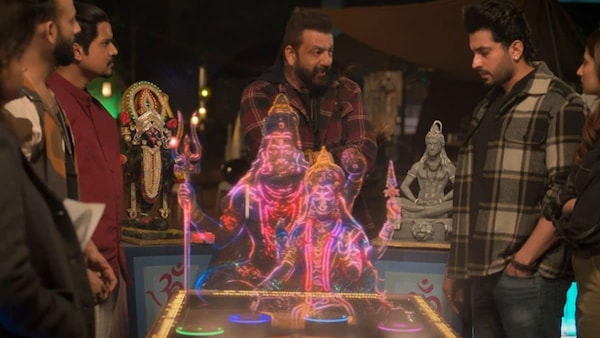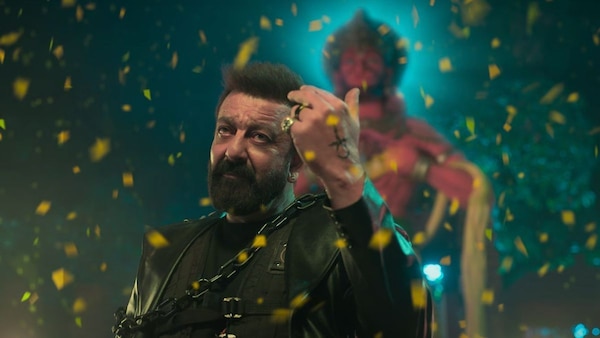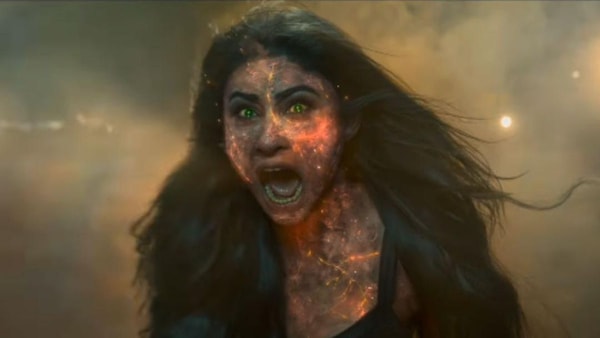The Bhootnii: Unimaginable, Unbelievable, Unfathomable
Sidhaant Sachdev's film throws you off the cliff where, beyond the worlds of Stree and Khauf, lies a ditch. The Bhootnii can be found there, awaiting its victims: the film critics.

Promo poster for The Bhootnii.
Last Updated: 02.44 PM, May 01, 2025
ONCE IN A WHILE, a film comes that breaks even the toughest of the tough. That, when watching, you do not question your existence but the fact that you are still alive. That scoffs at a regular cinephile and vows to teach them a lesson for still wanting to watch Hindi films. Once in a while, a film makes sitting through it an art form and filmmaking into a joke. This year, it is Sidhaant Sachdev’s The Bhootnii.
The 'the' in the title is the only, and the last, semblance of respect the filmmaker offers to anybody associated with the film – actors and audience alike. Everything beyond this unfolds as an assault to the senses and disrespect to the fact of living and the art of surviving. Rage should have made me more coherent, but Sachdev’s film has broken me. If it were a living entity, it would be sitting across and, seeing my lifeless stare into the laptop, celebrating my defeat.

But I wasn't always this weak. I have survived every Salman Khan acting attempt in the last decade, every Akshay Kumar patriotic film in the last couple of years, which not only multiplied itself as the months went by but turned jingoism on its head by portraying the actor as both the propagandist and the subject of propaganda. I have watched Hindi cinema transition from experimental and cool to stale and cowardly. I have witnessed the fall and the resurgence of Shah Rukh Khan and the conservative Dharma Productions getting a woke makeover. I have seen Ananya Panday learn to act and Tiger Shroff’s abs being the best performer in a film. I have seen a lot, but nothing like The Bhootnii.

If the avoidance of adjectives is already noticeable, then I confess it is deliberate. I do not have an appropriate description for Sachdev’s film, and the irony of this does not escape me. It is vindictive fan fiction of the highest order: a film critic goes to watch a film and comes back bereft of her power to write about it. Is this what everything was about? My relocating to Mumbai, braving the relentless monsoon to watch Hindi films every week, staying up nights to craft arguments about fictional characters? Is this what my profession will be from now on? Is this what my life has come to?
Some might call it post-art or anti-art. Some might call it a desperate attempt by Sanjay Dutt to cash in on the current success rate of horror comedies, or an exhibition of Sunny Singh’s complete lack of acting skills. Some might remember it as accidental filmmaking, or a joke of a story taken too far. Some might hail it as Bengali propaganda where a Bengali actor (Mouni Roy) is cast as the ghost, even when every actor in the frame, displaying zero expression, could have done the role. An overthinker might see the premise, that of a dormant female ghost resuming haunting on the drunken complaints of a man in the hope that he will love her, as a strident commentary on gender politics where women, dead or alive, tend to settle for the bare minimum.

Some might, rightfully, question the purpose of a college in The Bhootnii, where not only is the weather difficult to guess (some students wear sweaters while others wear crop tops, all in the same frame) but the existence of classrooms is impossible to establish. Everything takes place in the courtyard — the love songs, students praying to the virgin tree, which apparently fulfils their wish for true love, ghost attacks, panic attacks, Sanjay Dutt attacks — as if Sachdev took Rabindranath Tagore’s idea of open schools and discussed it with a friend in Delhi.
Any self-respecting Bengali would bristle at the mention of Tagore in such a context. Till yesterday, I would have done the same. But Sachdev’s film pushes you to see beyond such petty discourse and discussions. It throws you off the cliff where, beyond the worlds of Stree and Khauf, lies a ditch. The Bhootnii can be found there, awaiting its victims: the film critics.
